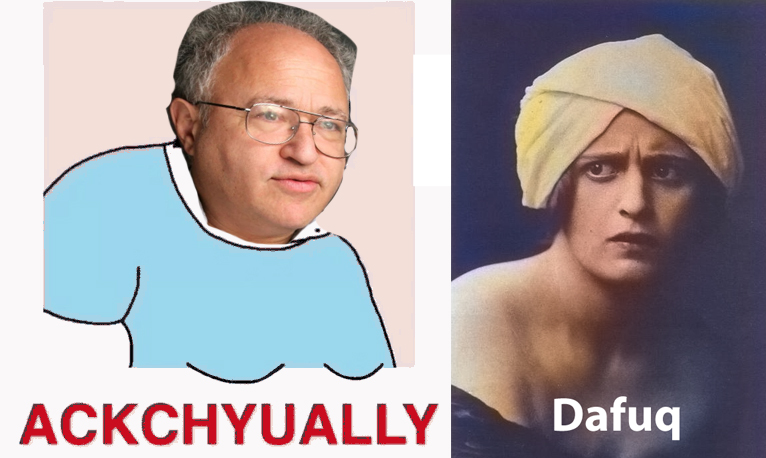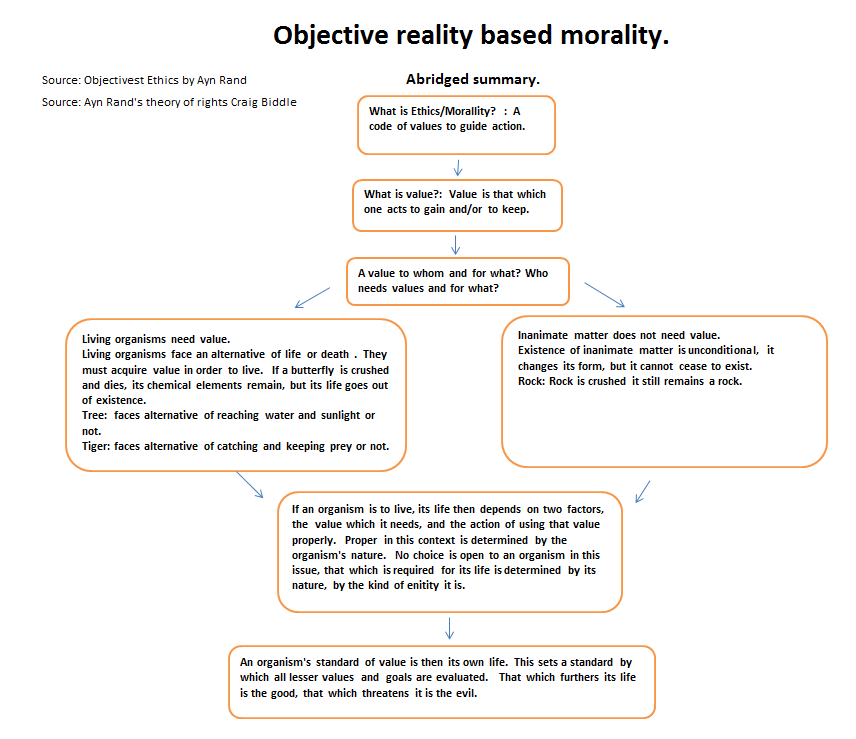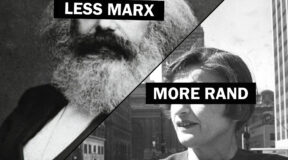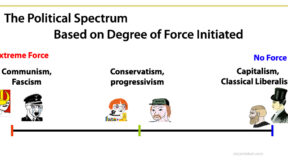
David Friedman, Milton’s son, once tried to refute Ayn Rand. What follows is his attempt, which is rather weak on two fronts. First he is either ignorant or purposefully misrepresents the objectivist position, and second, even his arguments against a strawman make no sense, and I am inclined to agree with the strawman he constructs rather than his opposing argument. Friedman’s arguments are in bold.
1. Existence as the value sought by living things:
“There is only one fundamental alternative in the universe: existence or non-existence–and it pertains to a single class of entities: to living organisms. … But a plant has no choice of action; … : it acts automatically to further its life, it cannot act for its own destruction.
An animal … . But so long as it lives, … it is unable to ignore its own good, unable to decide to choose the evil and act as its own destroyer.”
The claim here, quite clearly, is that living things other than human beings automatically act for their own survival. That claim is false. A male mantis, for example, mates, even though the final step of the process consists of being eaten by the female. Female mammals get pregnant, even though (especially in species where the male does not help support female and offspring) doing so substantially reduces their chances of survival. If one is going to ascribe values to non-human living things, the purpose of those values, on both empirical and theoretical grounds, is not survival but reproductive success.
Of course, survival is usually a means to reproductive success, so most living things most of the time are trying to survive. But a living being that put survival above everything else would not reproduce, so its descendants wouldn’t be around for Rand to use as evidence in deriving oughts.
Some philosophies, I suppose, could dismiss all of this as irrelevant to metaphysical argument. But Objectivism claims to base its conclusions on the facts of reality–and the “fact” with which Rand starts her argument is false.
If you are familiar with objectivism, you can see Friedman is all over the place. The first step of objectivists ethics is to establish that the concept of value is only possible to living things. Friedman doesn’t represent this argument at all, and goes on a tangent talking about survival. All references from Rand about survival come much later in the proof, so the fact that Friedman quoted existence and survival in secession is a pure misrepresentation. Objectivism doesn’t ascribe value to living things based on survival. Objectivism ascribes value only to living things, human or none human because only living things need value. Inanimate matter does not need value. Life is what makes the concept of value possible. Later Rand also talks about human volition and compares it to animals, which is the bit that Friedman also quoted completely out of context. The important fact to establish here is what kind of entities need value, and the answer to that is living entities, which Friedman does not address.
2. Life or death as the fundamental value choice:
“Since life requires a specific course of action, any other course will destroy it. A being who does not hold his own life as the motive and goal of his actions, is acting on the motive and standard of death.”
Consider someone following a value other than Rand’s–a utilitarian, say, or a nationalist. His life is not the motive and goal of his actions, but it is usually a means to the achievement of his goal. If he isn’t alive, he can’t have utility himself, nor can he act to increase the utility of others–and similarly if his goal is the triumph of his nation. So such people usually take the actions required by their own survival. But their life is not their goal, as becomes apparent when they have an opportunity to achieve their goal at the cost of their life–assassinate Hitler, say, with the knowledge that they will die in the process.
The first sentence quoted above is false. It is not true that there is a specific course of action required for life and any other course will destroy it. There are a great many different courses of action which preserve life with varying degrees of success. Rand’s statement, taken literally, is contradicted by the facts of reality. If such people were acting on the motive and standard of death they would commit suicide at the first convenient opportunity, and there would be nobody but Objectivists left. That hasn’t happened.
A more charitable interpretation is that Rand means that if you do not take your life as your goal, you are choosing a little death–a slightly higher probability of death, a somewhat shorter life expectancy. That is a true statement, but the equivalent is equally true for any value one might propose. The utilitarian could argue that a non-utilitarian, by not acting in the way that maximizes human happiness, is choosing a little misery. A utilitarian Galt could go on to assert that “A being who does not hold the happiness of all men as the motive and goal of his actions, is acting on the motive and standard of human misery.” His argument would be as good–which is to say as bad–as Rand’s.
Since we have established that life requires value to continue, all that course of action means here, is the proper actions done by the living organism to attain value. Since this is a general statement about life needing action to acquire value, and not some specific course like Friedman claims, you can easily see that the opposite of action to attain value does mean death.
Now let us take Friedman’s example of a nationalist pursuing a goal but his life not being the motive of his actions. So what? How is a person’s irrational motive relevant to what sustaining his life requires? The requirement for his life remains the same independent of his motive. If he continues to attain the values needed for his life, even though that is not his motive he will continue to sustain his life, if he doesn’t, then he will die.
A rational person would recognize that hierarchically their life is by which all other values are judged. So let us say a person is pursuing a more worthy goal than nationalism like productivity. They too place this goal of productivity as their main motive over life. They only keep them selves alive to be productive. But to whom is productivity a value, to them obviously, to their life. Just because a person can be mistaken, and illogically place lesser values over the standard of value doens’t mean that this changes reality. When a person puts values in proper logical order, they can acutally more rationally examine their goals. If the natioanlists for example would hold his life as the main motive first, he may discover that nationalism doesn’t actually promote life.
I have to mention here that Friedman appears to be quoting form John Galt’s speech in Atlas Shrugged. That speech has its own context, and for this subject he should be quoting from the Ethics of Objectivism essay by Ayn Rand.
3. The shift from life to life as man qua man:
“Man’s life is the standard of morality, but your life is its purpose. If existence on earth is your goal, you must choose your actions and values by the standard of that which is proper to man–for the purpose of preserving, fulfilling and enjoying the irreplaceable value which is your life.”
(this passage actually precedes the one I quoted just above, but is relevant to the next point I want to make)
This seems fairly clear. My life is the purpose of my morality, and the reason that I must choose a certain sort of morality is that that sort of morality is the best way of preserving, fulfilling and enjoying my life. The only puzzle is where “fulfilling and enjoying” come from, given that the previous step hinged on the choice of existence or non-existence. By the logic so far, “fulfilling and enjoying” belong in the argument only as means to the goal of preserving.
This is the point where the argument I introduced a month or so back takes off from. “Your life” means what it says, so if I can show that your physical survival is enhanced by an act then, according to the argument up to this point, you should do it. A means cannot trump the end it is a means to.
“No, you do not have to live as a man … . But you cannot live as anything else–and the alternative is … the state of a thing unfit for existence, no longer human and less than animal, a thing that knows nothing but pain and drags itself through its span of years in the agony of unthinking self-destruction.”
At this point, Rand is using passionate oratory to obscure a shift in the argument. She is claiming that someone who lives a full lifespan “in the agony of unthinking self-destruction” isn’t really acting for his life. But the fact that he lives a full span of life is evidence that he is not in fact destroying himself. Somehow, something extra has been slipped into the argument, to convert “life” into “the kind of life Rand thinks you should live,” where the latter is not deducible from the former.
Friedman is confused about how the enjoyment of life is derived from living things needing value. Well, he doesn’t quote the entire proof so it must not exist right? I can’t quote the entire proof here either, you should read it for yourself, but the extremely short version is this. We have established that only living organisms need value. The type of value an organism needs is set by the nature of its life. Meaning that which is required for its life is determined by its nature. A bird needs a different type of value than a fish. So clearly the standard of value for any living organism is their own life. The same goes for man, the standard of value for a man is his own life. Man is a very complicated organism and needs a whole range of values. Those values must be discovered through reason, and keep in mind, they are not easily discovered. However, if they are discovered, and attained, they bring joy and happiness to the man that attains them.
4. The shift from surviving by reason to Objectivist ethics:
“Honesty is the recognition of the fact that the unreal is unreal and can have no value, that neither love nor fame nor cash is a value if obtained by fraud–that an attempt to gain a value by deceiving the mind of others is an act of raising your victims to a position higher than reality, where you become a pawn of their blindness, a slave of their non-thinking and their evasions, while their intelligence, their rationality, become the enemies you have to dread and flee … .”
According to Rand, values are things you act to get and keep; in that sense cash obtained by fraud is obviously a value for some people. If we interpret “value” in this passage as meaning “value for your life,” hence “value of the sort Rand is arguing you should seek,” it is still puzzling. Money obtained by fraud will pay for just as much food or medical service as money obtained honestly.
The rest of the quoted passage is a highly colored exposition of a true point–that if you defraud people, you have to worry about being detected. The problem is that Rand is drawing an absolute conclusion that her argument does not justify. Different opportunities to defraud people have different risks of detection and victims vary in their ability to retaliate against fraud if they detect it. So the implication of the argument is not that one should always be honest, but that one should be prudent in one’s dishonesty–which is not, of course, the result Rand wants.
“To interpose the threat of physical destruction between a man and his perception of reality is to negate and paralyze his means of survival; to force him to act against his own judgment, is like forcing him to act against his own sight. Whoever, to whatever purpose or extent, initiates the use of force, is a killer acting on the premise of death … .
To force a man to drop his own mind and to accept your will as a substitute, with a gun … is to attempt to exist in defiance of reality.”
Using force against someone reduces his ability to use his reason to preserve his life. Reality implies that the victim is less likely to have a long and healthy life. But the coercer is not trying to defy that reality–his objective is not his victim’s life but his own.
Values are what you try to gain or keep, but they are not without prerequisites. We skipped much of the proof, so this may not be as clear, but Friedman misses the point here completely anyway. Why is attaining something through fraud or theft not a value, even though as Friedman says money attained through theft will pay for the same amount of food? If we read the entire proof, we would know by now that value is created through reason, and force negates the use of reason. Trying to provide a value through force is like making a picture gallery for the blind. Sure the thief is only concerned for himself in that moment of time. However, if he was rational, he would notice that negating that which created the value in the first place, is a course of action that will result in no values being created. Ayn Rand doesn’t construct the ethics of objectivism based on what irrational people like a thief might think, she constructs it based on facts of reality.
I have created this flow chart of the partial guide to objectivist ethics. This is just part one, that establishes that an organism’s own life is that standard of value for that organism. Part 2 will dive into man and other living organisms specifically.





